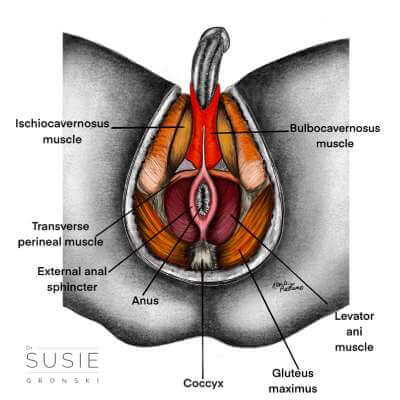3 Tips to Reduce Erectile Worry and Enjoy Sex
By Susie Gronski
Pelvic Physiotherapist & Rehab Practitioner, AASECT Certified Sexuality Educator and Counselor
Sexual performance worry and anxiety negatively impacts male sexual function by inhibiting sexual arousal, sexual desire, and sexual functioning. The brain is the biggest “sex organ” and understanding this essential connection is key to harnessing sexual fulfillment and satisfaction.
According to the World Health Organization, sexual health is defined as “a state of physical, emotional, mental and social well-being.” It is considered one of the four pillars of health which also encompasses mental, spiritual, and physical health. Mental health can affect sexual function and sexual dysfunction can affect mental health. Research has shown an association between mental health conditions like depression, anxiety, and sexual dysfunction, but it is unclear whether or not these mental health conditions directly cause sexual dysfunction or vice versa. Individuals who experience depression often lose interest in activities they enjoy, including sex. Fatigue, low-self esteem, and social withdrawal can negatively impact a person’s sexual desire, motivation and arousal. Similarly, experiencing sexual dysfunction (which is often quite distressing for the individual and or partner(s) and their relationships) might contribute to changes in mood or the development of mental health conditions like depression and anxiety.
When there are feelings of worry, stress or anxiety about something, like pain or pressure to please or perform, this ramps up the sympathetic nervous system which means increased arterial constriction (blood flow changes to urogenital organs and the digestive system) muscular guarding and tension, and diminished sexual appetite. Parasympathetic nervous system up-regulation (physiological relaxation) is essential for psychogenic arousal and genital arousal (i.e: to get an erection)
Here is an oversimplified explanation of the sexual response cycle in men:
Physical stimulation to the genitals or other erogenous areas and psychological stimulation activates sensory nerve fibers in genital tissues via the pudendal nerve (predominantly modulated by the parasympathetic nervous system). These nerve signals travel up to the spinal cord which then activate motor nerve fibers that send signals to muscles surrounding the penis (bulbospongiosus and ischiocavernosus muscles). These muscles contract, squeeze and pull on erectile tissue which assists with an erection and engorgement of erectile tissues. At the same time, these nerve signals cause arteries in the penis to relax and dilate allowing blood to enter the penis. As the penis gets more erect, the increase in penile pressure compresses veins to prevent blood from leaving the penis.
After ejaculation, the sympathetic nervous system modulates the flaccid state causing arteries in the penis to constrict and blood flow to exit the penis.

The brain has the power to inhibit or facilitate any of the above processes which is why it is important to view sexuality in relation to the whole person (biological, psychological, sociocultural, and interpersonal influences on their sexuality). For example, if there is sexual pain, fear, or any other potential threat to the person, their body, their identity, relationships, work, hobbies, etc., this will ramp up protective mechanisms orchestrated by the brain. The brain is always predicting the next step ahead and weighing the world for us moment by moment. These predictions produce outputs like motor responses (muscle activation or inhibition), feelings, emotions, and influence behavior).
It is important to understand that sexual response is much more complex than the brief description above. Psychological and biological processes, willingness and motivation for sexual engagement, emotional intimacy, overall well-being, and relational factors play a major role in the context of sex and our experiences sexually.
Three tips to help men relax and enjoy sex:
- Understand that sexuality is fluid; constantly growing and evolving throughout your (and your partner’s) life and as well as your relationship
- Embrace the “good enough sex” mindset where you value flexibility and variability in your sexual experiences. Accept that not every sexual experience is “perfect.” Some sexual experiences may be so-so, some amazing, and some everything in between. Acceptance of each other, the situation, and the experience for what it is without blame or shame is imperative for a healthy sexual relationship
- Your penis is not a machine. Shift away from performative-based sex and expectations to pleasure-oriented sex. Give yourself (and your partner) permission to absorb yourself in your own pleasure experience without feeling responsible for your partner’s experience or pleasure. You are each responsible for your own pleasure
Since erectile difficulties can stem from both physical and psychological origins, finding a healthcare professional to help you figure out the dominating factor(s) is key. Yes, Google MD can be helpful if you know how to weed out the misinformation. But even better to get the pros to help you out.
Visit my web site for free sexual and pelvic health resources.
Specializing in men’s pelvic and sexual health for over a decade, Dr. Susie Gronski is a Licensed Doctor of Physical Therapy, Certified Pelvic Rehabilitation Practitioner, AASECT Certified Sexuality Educator and sexuality counselor, an international teacher and author of Pelvic Pain the Ultimate Cock Block. Dr. Susie is the founder of an interdisciplinary pelvic and sexual health clinic exclusively for men.
References:
- https://www.who.int/health-topics/sexual-health#tab=tab_1
- https://www.smr.jsexmed.org/article/S2050-0521(18)30145-8/pdf
- https://www.tandfonline.com/doi/abs/10.1080/14681990601013492
- https://www.issm.info/sexual-health-qa/do-mental-health-problems-have-an-effect-on-sexual-function#:~:text=Anxiety%20and%20Sexual%20Health,to%20sexual%20desire%20and%20arousal
- LeVay, S., & Baldwin, J. (2012). Men’s bodies. In Human sexuality (4th ed., pp. 86-116). Sunderland, MA: Sinauer Associates, Inc.

